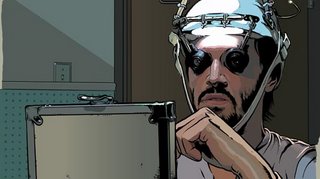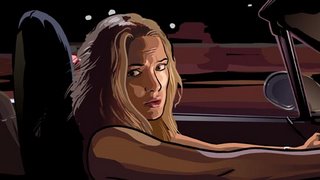
I won't be waiting on line to see the much-touted PIRATES OF THE CARIBBEAN sequel. Why the cult that had been gathering for years around its star, Johnny Depp, exploded around the first one I'll never fathom. It was, to me, a spoofy, HUDSON HAWK-ish swashbuckler with the usual after-thought script and tinsel production values associated with producer Jerry Bruckheimer, and my eyelids were in full flutter during the press screening. I figured it a cinch for Davy Jones' locker, but audiences and Oscar nominators found Depp's scruffy pirate adorable, and maybe there was some pent-up demand for swashbucklers I had missed (Manhattan's Film Forum has a bunch of good ones scheduled for August). And now there are not one, but two, sequels sighted, the first with undead fish people pirates. I don't know what to think. I was the one caught napping the first time, but maybe my brethren will wake up this time and realize how truly dopey this all is (or, hey, maybe it'll actually be good...).
Opening the same day (July 7), with less fanfare and on far fewer screens, is the antidote, Richard Linklater's superior adaptation of Philip K. Dick's A SCANNER DARKLY (Warner Independent Pictures), easily one of the best films of the year. Linklater, a staunch indie filmmaker, had become a cause for concern. I couldn't begrudge him his success with SCHOOL OF ROCK, as lightweight and forgettable as any Jack Black vehicle, but last summer's BAD NEWS BEARS was a shockingly lazy remake, a completely phoned-in assignment that suggested a distressed cynicism on the filmmaker's part. I know he had written and directed SLACKER but this was taking slacking a bit too far, and the creator of DAZED AND CONFUSED, BEFORE SUNRISE and BEFORE SUNSET seemed unsettlingly adrift. Not so with A SCANNER DARKLY, which manages, amazingly, to be faithful to its author's intentions while being fully Linklater besides*.
What unifies the film is its form---like Linklater's trippily philosophical WAKING LIFE (2001), A SCANNER DARKLY was shot live, then animated via rotoscoping techniques that designer Bob Sabiston has refined for the new film. Given its rootless content, WAKING LIFE was appropriately jittery and twitchy, but I know some viewers didn't cotton to what was like looking into a faster-moving lava lamp for 100 minutes. With one notable exception, A SCANNER DARKLY is more "solid," though it, too, has an unmoored feeling; cars and roads, for example, seem to exist on slightly separate planes. But this isn't a showoffy gimmick; thanks to Substance D, a drug that has 20% of the U.S. population hooked seven years hence in the world of the film, consciousness has been altered, and everyone, from the afflicted to the drug czars, is swimming in in its after-effects and consequences. Everything looks the same but nothing looks quite right.
Animation solves the biggest problem afflicting adaptations of Dick's work, many of which I've enjoyed at least in part (except John Woo's PAYCHECK, the title of Dick's story and the reason why anyone seemed to be making the movie). They establish a bleak, noirish premise and a similar mood, which is instantly disrupted when a mechanical effect, CGI creature, or chase scene is introduced. Dick's tough-minded prose handles all this with ease (assuming the robots, monsters, and pursuits were his inventions and not the vamping of a screenwriter trying to flesh out his sometimes very short stories) but live-action movies like TOTAL RECALL and MINORITY REPORT have a harder time of it, eventually giving into black comedy gags or reassuring sentiment. (The very "phildickian" BATTLESTAR GALACTICA TV show has, admirably, absorbed the tone without compromising or sentimentalizing typical Dick themes of alienation and paranoia). But animation is already unreal to our eyes, and more readily assimilates the wilder notions of the plotline, including a hectoring, thousand-eyed sentinel at the doorway to the afterlife, characters who casually sprout insect features, and, at the very start, an itchy infestation of aphids that a D addict has, or has not, hallucinated. This "cool stuff," which would be showstoppingly achieved in an expensive feature film, is here part of the show, and not the show itself. A SCANNER DARKLY was drawn from Dick's own experiences with drugs, visions, and paranoia, and the form honors and respects its source.
Rotoscoping realization also makes Keanu Reeves, so coolly "perfect" in THE MATRIX movies, a little more human. I was initially put off by his flat line readings, but came to see this as an asset; his character, Robert Arctor, is trying to keep his bearings, and his balance, in a tricky situation. A suburban dropout who has landed in Anaheim, CA, Arctor spends some of his day in a rundown household he shares with his D-dropping buddies, Barris (Robert Downey, Jr.) and Luckman (Woody Harrelson). Freck (Rory Cochrane), who is on the verge of D psychosis, and Arctor's sort-of girlfriend, Donna (Winona Ryder, a welcome presence even in facsimile form), also drop by, for some of Linklater's hilariously cockeyed conversations on the meaning of life as argued by people who live life in the grip of highly questionable stimulants. (Downey, Jr. and Harrelson could probably string this kind of material along all day long and score with it, over and over again). As part of his job, Arctor takes D, too--what his comrades don't know is that he works as an undercover narcotics agent, sniffing out D users and their supplier networks.

What Arctor doesn't know is that maybe his friends do know about his spying; Donna, an admitted cokehead who works, ironically, in surveillance, scanning the movements of suspects, is almost certainly onto him, but may not be his greatest threat to his double life. His own growing infatuation with D may be his undoing, as his bosses plumb his involvement with the drug. Not that they can see him--in the one flickering effect I had mentioned, Arctor wears a disguising "scramble suit," which constantly shifts identities, to the office, and to pro-drug war functions like booster club meetings, to maintain his cover. Industrial Light & Magic would have had a field day with this thing, but in the animated world it's just part of the fabric, as the film deepens into a multifaceted commentary on, and critique of, drug taking, drug laws, and recovery. The coda--a recounting, by Dick, of his own losses to drugs, is quietly shattering.
But I wasn't just moved by A SCANNER DARKLY. For a few hours after I saw it, I actually caught it. Minor encounters with people on the subway seemed slightly heightened. I felt hesitant and unsure with people I knew, tinged, just a touch, with suspicion, but also a little more open to the encounter. I can't explain it; it wasn't unpleasant, it just was. How will I feel on a second viewing? All I can say is that my first impression of A SCANNER DARKLY was unexpectedly transforming. Movies as rich as this can be habit-forming.
More on Dick, the film, and the source material, here. And find out how Dick, gone many years, lost his head in service of this film. I hope for a safe recovery.
*Reliable sources tell me that Linklater's other adaptation this year, of the best-seller FAST FOOD NATION, isn't as potent, but this is a startlingly ambitious couple of films. If making BAD NEWS BEARS helped cleanse his palate for them, maybe it's not so distasteful.


No comments:
Post a Comment